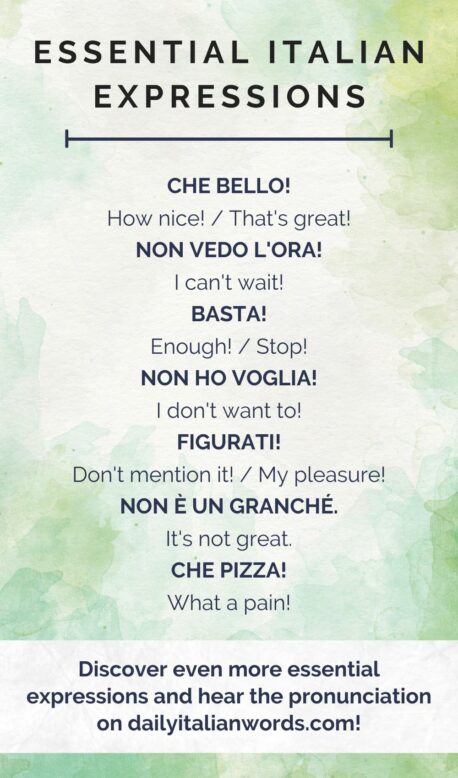One of the questions we often get asked is “How can I speak Italian like a native?” In addition to obvious methods such as improving your pronunciation, grammar and vocabulary, the best way to learn how to sound like a native Italian speaker is to focus on learning specific words and expressions to add that native “je ne sais quoi” to your speech. Expressions that, perhaps, don’t have an exact equivalent in your own language, or are idiomatic and therefore not easily translatable.
In this article, we have come up with a list of twenty words and expressions that will help you sound more like a native speaker when you speak Italian. Let us know in the comments if you can think of any others!

1. Che bello!
If something leaves a positive impression on you, such as a gorgeous landscape, a moving film, or a friend’s good news, you can always rely on the expression Che bello!
It literally means How beautiful! but more accurately equates to English expressions like:
- That’s great / wonderful / beautiful!
- It’s so great / wonderful / beautiful!
- Yay! / Hooray! / Woo hoo!
Domani torna mio figlio! – Che bello!
Tomorrow my son is coming home! – That’s great!

Note that Italians absolutely love to place question words (e.g. che / come / quanto) at the beginning of a sentence to express surprise, excitement or any other strong emotion. In English, on the other hand, we tend to prefer the adverb “so” to express the same idea.
- Com’è bello questo quadro! = This picture is so beautiful! (lit. How beautiful this picture is!)
- Quant’è stupido questo film… = This film is so stupid… (lit. How much stupid is this film…)
- Che carina che è! = She’s so cute! (lit. How cute she is!)
2. Macché!
Macché is the abbreviation of ma che dici (“what are you saying”) and is used to oppose another person’s affirmation, or to deliver a negative response in a situation where a positive response is expected, much like the English expressions:
- Oh, come on!
- Are you kidding me?
- As if!
- Yeah, right!
- I wish!
Ti ha ripagato? – Macché!
Did he pay you back? – As if!

3. Mi raccomando.
Mi raccomando is a quintessentially Italian expression that is notoriously difficult to translate into English. That’s because this one little phrase embodies this entire concept:
“I am giving you advice because I care about you and I hope that you will do what I suggest for your own good.”
Mi raccomando is sometimes rendered as “please“, “don’t forget“, “I really mean it” or “I’m trusting you” in English but none of these translations truly encapsulate its full meaning.
For example:
Non toccare il forno, mi raccomando.
Don’t touch the oven, please.
(I’m telling you this because I care about you and don’t want you to get hurt).

Because it is used when giving advice or suggestions, you will hear parents using it a lot with their children, especially when they want to encourage good behaviour.
Mi raccomando, sii bravo quando sei dalla zia.
Don’t forget (and listen to my kind advice), be good when you’re at your aunt’s house.
For a complete explanation on how to use this expression in Italian, check out My Corner of Italy‘s article on the topic – mi raccomando, it’s really good! 😉
4. Cosa vuoi che ti dica?
If you’re chatting about a difficult topic with a friend, and wish to emphasise the fact that you are unable to explain, excuse, or clarify something any further, you can use the expression Cosa vuoi che ti dica? (What can I say?) It’s also an excellent phrase to put an end to a conversation.
Com’è che sei andata male all’esame? – Cosa vuoi che ti dica? Ero troppo stanca!
Why did you do badly on the exam? – What can I say? I was too tired!

5. Non vedo l’ora.
In English, we use the expression “I can’t wait” when we are excited about doing or seeing something. But in Italian, they use a completely different expression – non vedo l’ora – which literally translates to something along the lines of “I can’t see the hour”.
Non vedo l’ora di cominciare il corso di danza domani, mi divertirò un sacco!
I can’t wait to start my dance class tomorrow, I’ll have lots of fun!

6. Dimmi!
If your child suddenly calls out “Mommy!”, a few of the most natural responses we might give in English include “What’s wrong?” “What’s up?” or simply “Yes?”
In Italian, on the other hand, it is really common for parents to respond with the command Dimmi! which means “Tell me!” It is more or less an abbreviation of Dimmi che cosa c’è (Tell me what’s up) or Dimmi che cos’è successo (Tell me what’s happened).
Mamma! – Dimmi! – Ho perso il mio orsetto…
Mommy! – What’s up? – I’ve lost my bear…
Of course, there’s no reason you cannot respond using the following:
- Cosa c’è? = What’s wrong / up?
- Cosa c’è che non va? = What’s wrong?
- Cosa? = What?
- Sì? = Yes?

7. Basta!
The exclamation Basta! – which derives from the verb bastare (to be enough) – can mean either enough or stop depending on the context. An extremely versatile term, it is almost always used to signal that something should come to an end.
Basta can be used in all sorts of contexts, such as when someone has had enough to eat or drink (e.g. Basta così grazie. = That’s enough, thanks.), or to express frustration or annoyance, as in Basta! Non ne posso più! which means Enough! I can’t take it anymore!
Basta parlare!
Stop talking!

8. Non ho voglia!
If you are feeling svogliato (sluggish / lazy), a great phrase you can use to express your mental state is Non ho voglia! It literally means “I don’t have desire” but more closely translates to “I don’t feel like it” or “I don’t want to”.
Non ho voglia di lavare i piatti…
I don’t feel like doing the washing up…
In very colloquial Italian, you will hear people say Non c’ho voglia! with the abbreviated particle ci. It serves to add that little bit of extra emphasis but be aware, sticklers for grammar may chastise you for using it.

9. Non mi va.
Another way of saying that you don’t feel like doing something or that you aren’t in the mood for something in Italian is Non mi va, which literally means “It doesn’t go for me”. For example:
- La pizza non mi va stasera. = I’m not in the mood for pizza tonight.
- Non mi va di andare al cinema. = I don’t feel like going to the cinema.
Vuoi venire in palestra con me? – No, oggi non mi va…
Do you want to come to the gym with me? – No, I’m not in the mood today…

10. Mi tocca…
In Italian, you can use verbs like dovere (to have to / must) and bisognare (to need to) to express duties, obligations and necessities, but if you want to sound like a real native, try using the expression Mi tocca.
Literally, mi tocca translates as “it touches me” but it is used to underline the fact that a person has the duty to do something, or is unwillingly being forced to do something. For example:
- Mi tocca pulire la cucina. = It’s up to me / it falls to me to clean the kitchen.
- Mi tocca alzarmi alle sei ogni mattina. = I have to wake up at six every morning.
Mi tocca andare dal dottore anche se non voglio.
I’ve got to go to the doctor’s even though I don’t want to.

11. Figurati!
As a response to grazie (thank you), there’s nothing wrong with using the default expression prego (you’re welcome). However, native speakers tend to prefer other expressions, one of the most popular being the friendly and laid-back Figurati! which is similar in tone to Don’t mention it! My pleasure! or Happy to help!
Figurati comes from the verb figurarsi which means “to imagine”. The formal equivalent is si figuri.
Grazie per il libro! – Figurati!
Thanks for the book! – Don’t mention it!

12. Non è un granché.
Ah, here we have one of my favourite sayings in Italian. It is used when you don’t feel something is particularly great, be it a dish you’ve just eaten or a disappointing film.
Non è un granché questa serie. Perché non guardiamo qualcos’altro?
This series isn’t great. Why don’t we watch something else?

13. Che pizza!
Italians love to mention food in their exclamations of frustration and annoyance, so much so that even their beloved pizza has become an interjection.
Che pizza! is very similar to our Darn! Shoot! and What a pain! in meaning. It literally means “What pizza!“
Ho una lezione domani mattina alle 8. Che pizza!
I have a lesson tomorrow at 8 a.m. What a pain!

14. Hai voglia…!
Hai voglia on its own can mean “you want” or “do you want” depending on whether it is a statement or a question. This is precisely how it is used in the phrases Hai voglia di venire? (Do you want to come?) and Vedo che non hai voglia (I can see you don’t want to) for example.
What many learners of Italian don’t realise is that hai voglia has a second meaning. When followed by the prepositions di or a, it implies that there is no point in doing something or that doing something isn’t going to help the situation. For instance:
- Sei sovrappeso. Hai voglia di camminare 15 minuti al giorno (se vuoi dimagrire). = You’re overweight. Walking 15 minutes a day isn’t going to help (if you want to lose weight).
- Hai voglia a chiamarla, non può sentirti! = It’s pointless trying to call her. She can’t hear you!
And on its own, it can actually translate as Sure! or Certainly! as in the following example:
Posso avere un biscotto? – Hai voglia!
Can I have a cookie? – Certainly!

15. Uffa…
Has someone’s attitude or an annoying situation got you huffing and puffing in despair? If so, you can use this rather cathartic expression – Uffa! – to let off some steam. Think of it as the equivalent of Ugh! or Argh! in English.
Uffa! Ma dove sei? Aspetto da ore!
Ugh! Where are you? I’ve been waiting for hours!

16. Non ce la faccio più!
From time to time, we all face a breaking point. Say you’ve had a long and stressful day, and all you want to do is jump under the covers and hide away from the world. On days like this, the perfect expression you can use in Italian is:
Non ce la faccio più!
I can’t take it anymore!

17. Che pasticcio!
If your child decides to toss his bowl of pasta on the floor, or throw his blocks all over the living room, you might find it hard not to exclaim What a mess! and the same goes for Italians. The word pasticcio is also used to refer to a person’s troubles or problems rather than a physical mess.
Che pasticcio che hai combinato!
What a mess you’ve made!

18. Mica
Mica is one of those sneaky words that seems to pop up in conversation all the time, but until you become relatively fluent in Italian, it can be difficult to comprehend its meaning completely, and even more challenging to use properly.
One possible translation is “it’s not like” as in the very common phrase Non l’ho fatto mica apposta! (It’s not like I did it on purpose!) However, it can also mean “at all” when used in conjunction with the word male (bad):
Non è mica male questo posto!
This place isn’t bad at all!
Sometimes it serves an emphatic role, as in the phrase Mica stai per partire? (You’re not about to leave, are you?) By adding mica, you are revealing your incredulity at the fact your friend is leaving.
In other cases it can mean “by any chance” as in Hai mica visto la mia giacca? (Have you seen my jacket by any chance?)

19. Tanto
The default meaning of tanto is a lot, much or many but did you know that it has a few other lesser known translations as well?
The one I want to mention here is “at any rate” or “anyway” as you will hear Italians use it in this sense all the time:
Prendi pure la penna, tanto ne ho un’altra.
Go ahead and take the pen, I have another one anyway.

20. In bocca al lupo!
Let’s bring this article to a close with an expression that every Italian learner should memorise from day one: In bocca al lupo! Literally translating as “in the mouth of the wolf”, it is how Italians wish each other luck, much like we say “break a leg” in English.
In bocca al lupo!
Good luck! / Break a leg!
In response to this phrase, you can say Crepi il lupo! (lit. may the wolf die) or the more modern Viva il lupo! (Long live the wolf!). You can find out more about this phrase in our dedicated article.


Heather Broster is a graduate with honours in linguistics from the University of Western Ontario. She is an aspiring polyglot, proficient in English and Italian, as well as Japanese, Welsh, and French to varying degrees of fluency. Originally from Toronto, Heather has resided in various countries, notably Italy for a period of six years. Her primary focus lies in the fields of language acquisition, education, and bilingual instruction.


